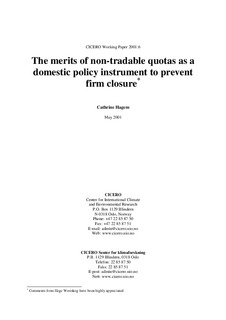| dc.contributor.author | Hagem, Cathrine | nb_NO |
| dc.date.accessioned | 2014-03-17T14:31:29Z | |
| dc.date.available | 2014-03-17T14:31:29Z | |
| dc.date.issued | 2001 | nb_NO |
| dc.identifier.issn | 0504-452X | nb_NO |
| dc.identifier.uri | http://hdl.handle.net/11250/192386 | |
| dc.description.abstract | There is a concern in many countries that a domestic tradable quota system for greenhouse gases, where all emitters must pay for their quotas, may lead to closures of emissions-intensive industrial companies. Allocating quotas free of charge to companies operating in competitive markets has been suggested as a means to reduce the likelihood of closures. Two different designs of quota systems are studied within a two-period model: one where the quotas given free of charge are tradable, and one where the quotas are non-tradable. The two quota systems are compared with respect to their ability both to induce the firms to implement investment in abatement technology and to prevent or postpone closures. | nb_NO |
| dc.language.iso | eng | nb_NO |
| dc.publisher | CICERO Center for International Climate and Environmental Research - Oslo | nb_NO |
| dc.relation.ispartof | CICERO Working Paper | nb_NO |
| dc.relation.ispartofseries | CICERO Working Paper;2001:06 | nb_NO |
| dc.title | The merits of non-tradable quotas as a domestic policy instrument to prevent firm closure | nb_NO |
| dc.type | Working paper | nb_NO |
| dc.source.pagenumber | 18 | nb_NO |
